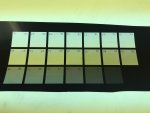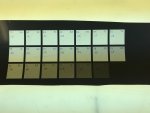I'm trying to gain more information as to what is causing this problem. I ran several jobs through our AccuSet 1000 image setter. The first job that was imaged reads correctly, but the jobs behind it all read 25-30 percent lower on the density block. I have changed the fixer and developer, and the temps are correct. The reason I am convinced this is an image setter issue is because I noticed a hard line through one of the films that measured properly, almost as if the density dipped back down to 70 percent. Also, I ran a motor cleaning in hopes that it might work, but no such luck. Has anyone experienced this issue first-hand? I'm open to any and all feedback. Thanks.















